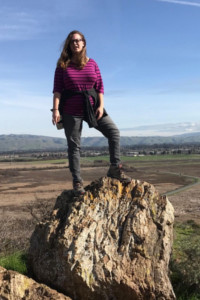
Chelsea Gordon received her BS in psychology from Michigan State University in 2012. She is a member of the sensorimotor neuroscience lab in the Cognitive and Information Sciences department. During her PhD, she has studied how embodied experience influences cognitive and perceptual processes. A series of experiments she conducted in virtual reality showed that the way we move our bodies during language learning has lasting effects on the way our brains represent language. She has also conducted research using transcranial magnetic stimulation to measure the involvement of the body and motor regions of the brain during perception of written language. She found that handwritten language activates the observer’s neural motor system more than typed text and also leads to improved memory for words.
Chelsea is passionate about collaborative and interdisciplinary science. She was the lead organizer for an interdisciplinary workshop on mental simulation, where researchers from across the country visited UC Merced to discuss cutting edge research. She works with a number of faculty across UC Merced as well as researchers at UCLA and in industry. She was recently named winner of the Looxid Happiness Challenge for her proposal to use VR, EEG, and eye-tracking to help people feel greater empathy and increase social connectedness.



